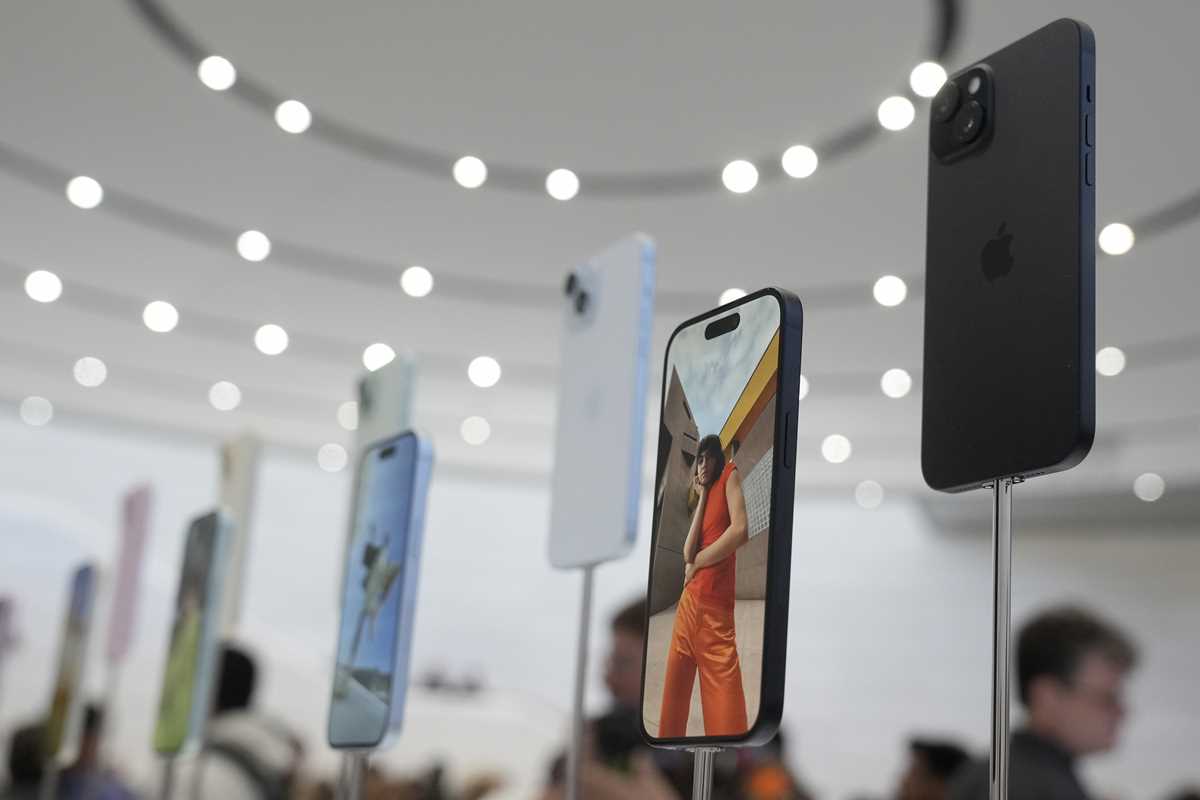 iPhone 15 phones are shown during an announcement of new products on the Apple campus in Cupertino, Calif., Sept. 12, 2023. The Justice Department announced a sweeping antitrust lawsuit Thursday, March 21, 2024 against Apple, accusing the tech giant of having an illegal monopoly over smartphones in the U.S. (AP Photo/Jeff Chiu, File)
iPhone 15 phones are shown during an announcement of new products on the Apple campus in Cupertino, Calif., Sept. 12, 2023. The Justice Department announced a sweeping antitrust lawsuit Thursday, March 21, 2024 against Apple, accusing the tech giant of having an illegal monopoly over smartphones in the U.S. (AP Photo/Jeff Chiu, File)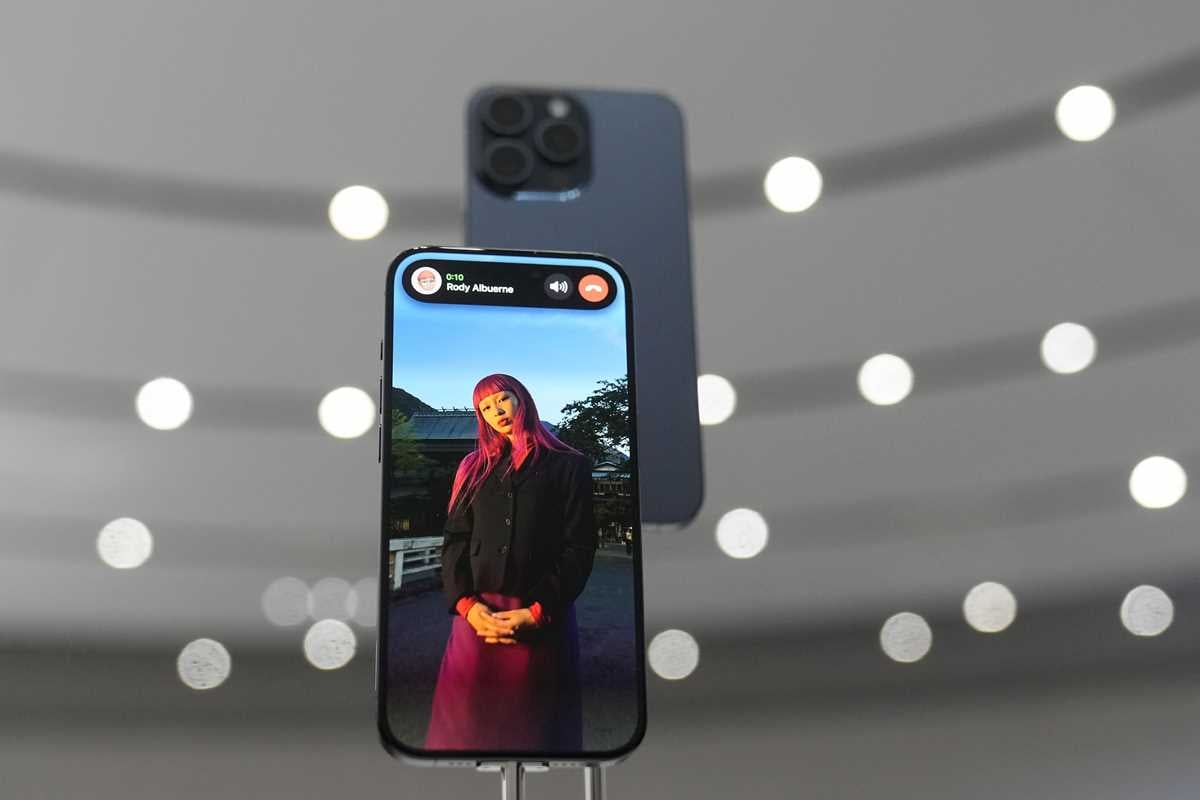 iPhone 15 Pro phones are shown during an announcement of new products on the Apple campus in Cupertino, Calif., Sept. 12, 2023. The Justice Department announced a sweeping antitrust lawsuit Thursday, March 24, 2024 against Apple, accusing the tech giant of having an illegal monopoly over smartphones in the U.S. (AP Photo/Jeff Chiu, File)
iPhone 15 Pro phones are shown during an announcement of new products on the Apple campus in Cupertino, Calif., Sept. 12, 2023. The Justice Department announced a sweeping antitrust lawsuit Thursday, March 24, 2024 against Apple, accusing the tech giant of having an illegal monopoly over smartphones in the U.S. (AP Photo/Jeff Chiu, File) The Apple logo is shown on a screen during an announcement on the Apple campus Sept. 12, 2023, in Cupertino, Calif. The Justice Department announced a sweeping antitrust lawsuit Thursday, March 21, 2024 against Apple, accusing the tech giant of having an illegal monopoly over smartphones in the U.S. (AP Photo/Jeff Chiu, File)
The Apple logo is shown on a screen during an announcement on the Apple campus Sept. 12, 2023, in Cupertino, Calif. The Justice Department announced a sweeping antitrust lawsuit Thursday, March 21, 2024 against Apple, accusing the tech giant of having an illegal monopoly over smartphones in the U.S. (AP Photo/Jeff Chiu, File) Attorney General Merrick Garland accompanied by New Jersey Attorney General Matthew Platkin and Deputy Attorney General Lisa Monaco, speaks during a news conference at the Department of Justice headquarters in Washington, Thursday, March 21, 2024. The Justice Department on Thursday announced a sweeping antitrust lawsuit against Apple, accusing the tech giant of engineering an illegal monopoly in smartphones that boxes out competitors and stifles innovation. (AP Photo/Jose Luis Magana)
Attorney General Merrick Garland accompanied by New Jersey Attorney General Matthew Platkin and Deputy Attorney General Lisa Monaco, speaks during a news conference at the Department of Justice headquarters in Washington, Thursday, March 21, 2024. The Justice Department on Thursday announced a sweeping antitrust lawsuit against Apple, accusing the tech giant of engineering an illegal monopoly in smartphones that boxes out competitors and stifles innovation. (AP Photo/Jose Luis Magana)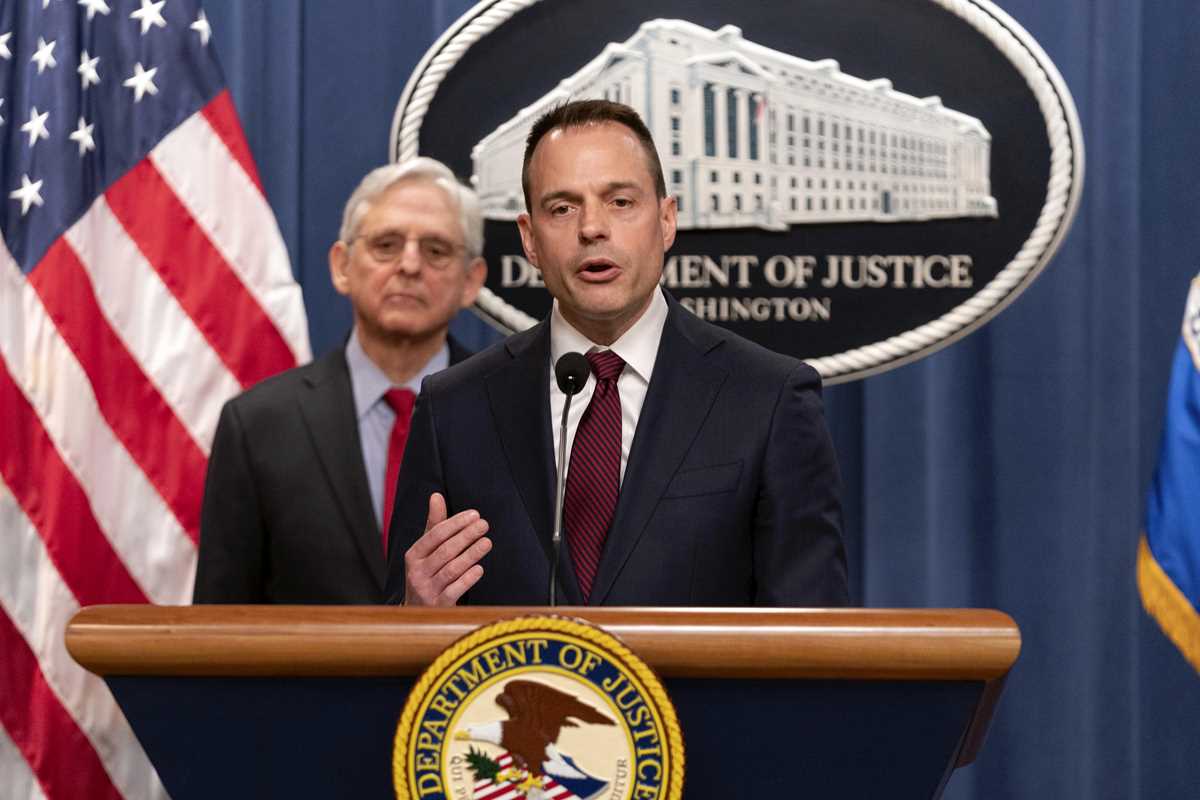 Acting Associate Attorney General Benjamin Mizer, speaks as Attorney General Merrick Garland listens during a news conference at Department of Justice headquarters in Washington, Thursday, March 21, 2024. The Justice Department on Thursday announced a sweeping antitrust lawsuit against Apple, accusing the tech giant of engineering an illegal monopoly in smartphones that boxes out competitors and stifles innovation. (AP Photo/Jose Luis Magana)
Acting Associate Attorney General Benjamin Mizer, speaks as Attorney General Merrick Garland listens during a news conference at Department of Justice headquarters in Washington, Thursday, March 21, 2024. The Justice Department on Thursday announced a sweeping antitrust lawsuit against Apple, accusing the tech giant of engineering an illegal monopoly in smartphones that boxes out competitors and stifles innovation. (AP Photo/Jose Luis Magana) Deputy Attorney General Lisa Monaco speaks as Attorney General Merrick Garland listens during a news conference at Department of Justice headquarters in Washington, Thursday, March 21, 2024. The Justice Department on Thursday announced a sweeping antitrust lawsuit against Apple, accusing the tech giant of engineering an illegal monopoly in smartphones that boxes out competitors and stifles innovation. (AP Photo/Jose Luis Magana)
Deputy Attorney General Lisa Monaco speaks as Attorney General Merrick Garland listens during a news conference at Department of Justice headquarters in Washington, Thursday, March 21, 2024. The Justice Department on Thursday announced a sweeping antitrust lawsuit against Apple, accusing the tech giant of engineering an illegal monopoly in smartphones that boxes out competitors and stifles innovation. (AP Photo/Jose Luis Magana) Assistant Attorney General Jonathan Kanter, of the Antitrust Division, speaks during a news conference at Department of Justice headquarters in Washington, Thursday, March 21, 2024. The Justice Department on Thursday announced a sweeping antitrust lawsuit against Apple, accusing the tech giant of engineering an illegal monopoly in smartphones that boxes out competitors and stifles innovation. (AP Photo/Jose Luis Magana)
Assistant Attorney General Jonathan Kanter, of the Antitrust Division, speaks during a news conference at Department of Justice headquarters in Washington, Thursday, March 21, 2024. The Justice Department on Thursday announced a sweeping antitrust lawsuit against Apple, accusing the tech giant of engineering an illegal monopoly in smartphones that boxes out competitors and stifles innovation. (AP Photo/Jose Luis Magana)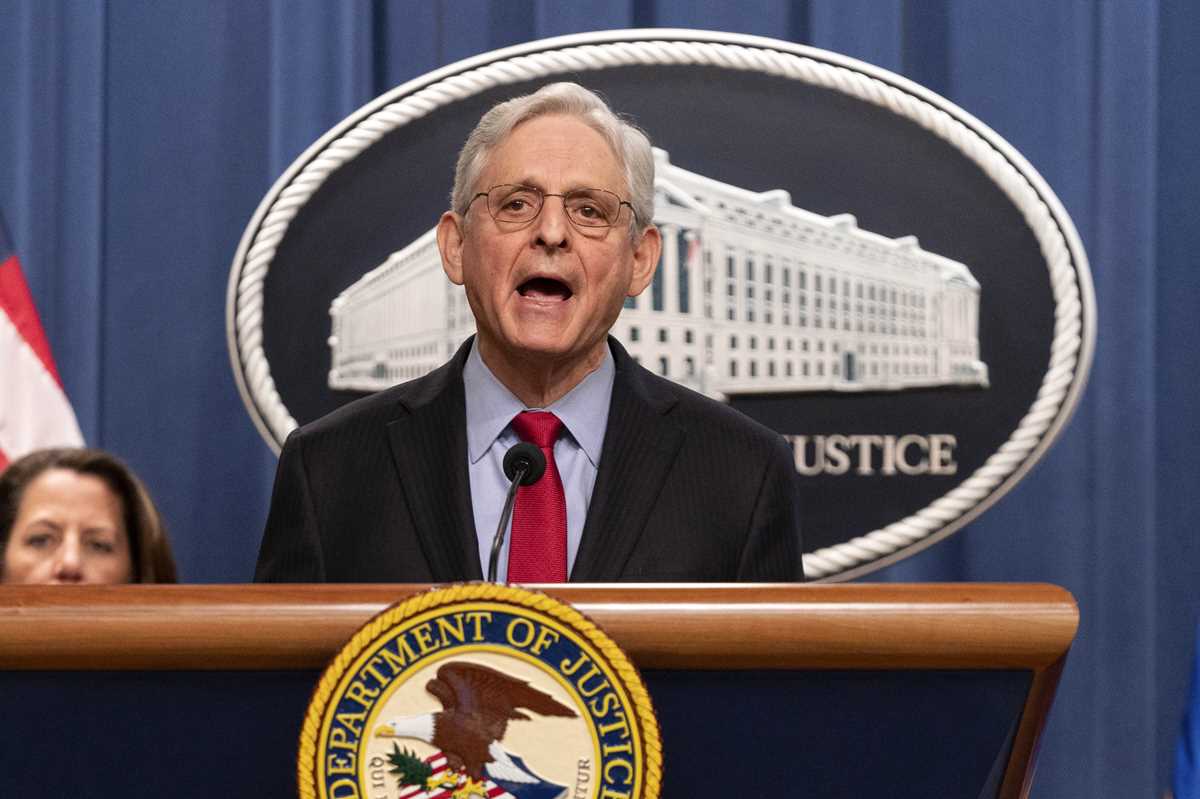 Attorney General Merrick Garland speaks during a news conference at Department of Justice headquarters in Washington, Thursday, March 21, 2024. The Justice Department on Thursday announced a sweeping antitrust lawsuit against Apple, accusing the tech giant of engineering an illegal monopoly in smartphones that boxes out competitors and stifles innovation. (AP Photo/Jose Luis Magana)
Attorney General Merrick Garland speaks during a news conference at Department of Justice headquarters in Washington, Thursday, March 21, 2024. The Justice Department on Thursday announced a sweeping antitrust lawsuit against Apple, accusing the tech giant of engineering an illegal monopoly in smartphones that boxes out competitors and stifles innovation. (AP Photo/Jose Luis Magana)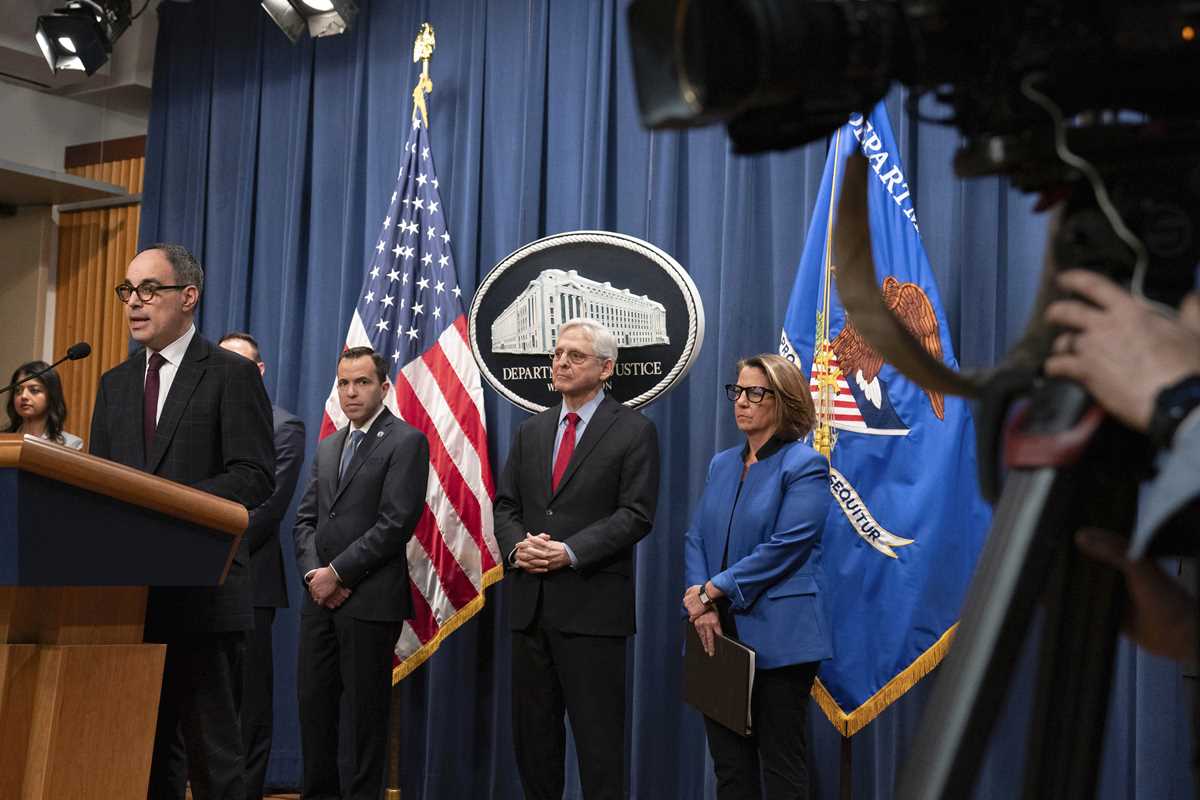 Assistant Attorney General Jonathan Kanter, of the Antitrust Division, from second left, speaks as New Jersey Attorney General Matthew Platkin, Attorney General Merrick Garland and Deputy Attorney General Lisa Monaco, listen during a news conference on antitrust complaint agains Apple at Department of Justice headquarters in Washington, Thursday, March 21, 2024. The Justice Department on Thursday announced a sweeping antitrust lawsuit against Apple, accusing the tech giant of engineering an illegal monopoly in smartphones that boxes out competitors and stifles innovation. (AP Photo/Jose Luis Magana)
Assistant Attorney General Jonathan Kanter, of the Antitrust Division, from second left, speaks as New Jersey Attorney General Matthew Platkin, Attorney General Merrick Garland and Deputy Attorney General Lisa Monaco, listen during a news conference on antitrust complaint agains Apple at Department of Justice headquarters in Washington, Thursday, March 21, 2024. The Justice Department on Thursday announced a sweeping antitrust lawsuit against Apple, accusing the tech giant of engineering an illegal monopoly in smartphones that boxes out competitors and stifles innovation. (AP Photo/Jose Luis Magana)WASHINGTON (AP) — The Justice Department on Thursday announced a sweeping antitrust lawsuit against Apple, accusing the tech giant of engineering an illegal monopoly in smartphones that boxes out competitors, stifles innovation and keeps prices artificially high.
The lawsuit, filed in federal court in New Jersey, alleges that Apple has monopoly power in the smartphone market and leverages control over the iPhone to “engage in a broad, sustained, and illegal course of conduct.”
“Apple has locked its consumers into the iPhone while locking its competitors out of the market,” said Deputy Attorney General Lisa Monaco. Stalling the advancement of the very market it revolutionized, she said, it has "smothered an entire industry.”
Apple called the lawsuit “wrong on the facts and the law” and said it “will vigorously defend against it.”
The suit takes aim at how Apple allegedly molds its technology and business relationships to “extract more money from consumers, developers, content creators, artists, publishers, small businesses, and merchants, among others."
That includes diminishing the functionality of non-Apple smartwatches, limiting access to contactless payment for third-party digital wallets and refusing to allow its iMessage app to exchange encrypted messaging with competing platforms.
It specifically seeks to stop Apple from undermining technologies that compete with its own apps -- in areas including streaming, messaging and digital payments -- and prevent it from continuing to craft contracts with developers, accessory makers and consumers that let it “obtain, maintain, extend or entrench a monopoly.”
The lawsuit — filed with 16 state attorneys general — is just the latest example of aggressive antitrust enforcement by an administration that has also taken on Google, Amazon and other tech giants with the stated aim of making the digital universe more fair, innovative and competitive.
“The Department of Justice has an enduring legacy taking on the biggest and toughest monopolies in history,” said Assistant Attorney General Jonathan Kanter, head of the antitrust division, at a press conference announcing the lawsuit. "Today we stand here once again to promote competition and innovation for next generation of technology.”
Antitrust researcher Dina Srinavasan, a Yale University fellow, compared the lawsuit's significance to the government's action against Microsoft a quarter century ago — picking a "tremendous fight” with what has been the world's most prosperous company.
“It’s a really big deal to go up and punch someone who is acting like a bully and pretending not to be a bully,” she said.
President Joe Biden has called for the Justice Department and the Federal Trade Commission to vigorously enforce antitrust statutes. While its stepped-up policing of corporate mergers and questionable business practices has met resistance from some business leaders — accusing the Democratic administration of overreach — it’s been lauded by others as long overdue.
The case seeks to pierce the digital fortress that Apple Inc., based in Cupertino, California, has assiduously built around the iPhone and other popular products such as the iPad, Mac and Apple Watch to create what is often referred to as a “walled garden” so its hardware and software can seamlessly offer user-friendly harmony.
The strategy has helped Apple attain an annual revenue of nearly $400 billion and, until recently, a market value of more than $3 trillion. But Apple’s shares have fallen by 7% this year even as most of the stock market has climbed to new highs, resulting in long-time rival Microsoft seizing the mantle as the world’s most valuable company.
Apple said the lawsuit, if successful, would “hinder our ability to create the kind of technology people expect from Apple — where hardware, software, and services intersect” and would "set a dangerous precedent, empowering government to take a heavy hand in designing people’s technology.”
“At Apple, we innovate every day to make technology people love — designing products that work seamlessly together, protect people’s privacy and security, and create a magical experience for our users,” the company said in a statement. “This lawsuit threatens who we are and the principles that set Apple products apart in fiercely competitive markets.
Apple has defended the walled garden as an indispensable feature prized by consumers who want the best protection available for their personal information. It has described the barrier as a way for the iPhone to distinguish itself from devices running on Google’s Android software, which isn’t as restrictive and is licensed to a wide range of manufacturers.
“Apple claims to be a champion of protecting user data, but its app store fee structure and partnership with Google search erode privacy,” Consumer Reports senior researcher Sumit Sharma said in a statement.
The lawsuit complains that Apple charges as much as $1,599 for an iPhone and that the high margins it earns on each is more than double what others in the industry get. And when users run an internet search, Google gives Apple a “significant cut” of the advertising revenue those searches generate.
The company’s app store also charges developers up to 30 percent of the app’s price for consumers.
Critics of Apple’s alleged anticompetitive practices have long complained that its claim to prioritize user privacy is hypocritical when profits are at stake. While its iMessage services is sheathed from prying eyes by end-to-end encryption, that protection evaporates the moment someone texts a non-Apple device.
But Will Strafach, a mobile security expert, said that while he believes Apple needs reigning in, he's concerned that the Justice Department’s focus on messaging may be misplaced and could weaken security and privacy.
“I am quite glad that access to SMS messages is restricted,” said Strafach, creator of the Guardian Firewall app.
He notes that a number of apps, ostensibly for weather and news, on iPhones have secretly and persistently sent users' GPS data to third parties. Strafach said he is concerned weakened Apple security "could open the door to stalkerware/spouseware, which is already more difficult to install on Apple devices compared to Android.”
However, prominent critic Cory Doctorow has complained that while Apple has blocked entities like Facebook from spying on its users it runs its “own surveillance advertising empire” that gathers the same kinds of personal data but for its own use.
“Apple has a history of clandestine deals with surveillance giants like Google, and (CEO) Tim Cook gave Uber a slap on the wrist instead of an app store ban when (the ride-sharing company) built a backdoor to spy on iPhone users who had already deleted Uber’s app,” noted Sean O'Brien, founder of Yale's Privacy Lab.
Fears about an antitrust crackdown on Apple’s business model haven't just contributed to the drop in the company’s stock price, there also is concern it lags behind Microsoft and Google in the push to develop products powered by artificial intelligence technology.
Antitrust regulators made it clear in their complaint that they see Apple's walled garden mostly as a weapon to ward off competition, creating market conditions that enable it to charge higher prices that have propelled its lofty profit margins while stifling innovation.
“Consumers should not have to pay higher prices because companies break the law,,” said Attorney General Merrick Garland. Left unchallenged, Apple would "only continue to strengthen its smartphone monopoly,” he added.
William Kovacic, a former chairman of the Federal Trade Commission who teaches at George Washington University, said he expects the core of Apple’s defense to be that it is not at all a monopoly in the smartphone market. Justice Department lawyers have built a “high-quality" argument of harm in the 88-page indictment with “impressive excerpts from the firm's own documents,” he said.
But don't expect a verdict until 2026 — which means the case could easily drag on with appeals.
The case escalates the Biden administration's antitrust siege, which has already triggered lawsuits against Google and Amazon accusing them in engaging in illegal tactics to thwart competition, as well as unsuccessful attempts to block new acquisitions by Microsoft and Meta Platforms.
In addition the FTC sued Facebook in 2020 over its acquisitions of Instagram and WhatsApp.
Kovacic predicts antitrust action by the FTC or Justice Department against Microsoft over its relationship with OpenAI is “coming up around the corner,” and “the two agencies are fighting over who will handle that better.”
“They foreshadowed this would be their agenda and they're filling out the agenda the way they said,” he added. “These are all high-stakes matters, and you can expect an intense and aggressive defense.”
Apple's business interests are also entangled in the Justice Department's case against Google, which went to trial last fall and is headed toward final arguments scheduled to begin May 1 in Washington, D.C. In that case, regulators are alleging Google has stymied competition by paying for the rights for its already dominant online search engine to be the automatic place to handle queries on the iPhone and a variety of web browsers in an arrangement that generates an estimated $15 billion to $20 billion annually.
With the Justice Department mounting a direct attack across its business, Apple stands to lose even more.
___
Liedtke reported from San Francisco.
Before you make your next trade, you'll want to hear this.
MarketBeat keeps track of Wall Street's top-rated and best performing research analysts and the stocks they recommend to their clients on a daily basis.
Our team has identified the five stocks that top analysts are quietly whispering to their clients to buy now before the broader market catches on... and none of the big name stocks were on the list.
They believe these five stocks are the five best companies for investors to buy now...
See The Five Stocks Here
Click the link below and we'll send you MarketBeat's list of seven stocks and why their long-term outlooks are very promising.
Get This Free Report